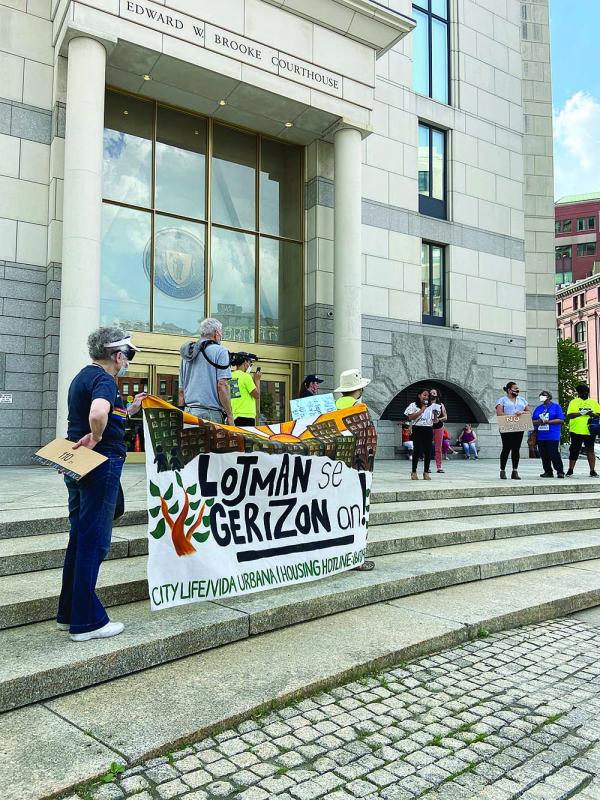June 17, 2021

Protestors held signs in various languages, and organization Language Justice provided consecutive interpretation for Spanish-speaking protesters.
Rebeca Pereira photo
Nonprofit City Life/Vida Urbana last Wednesday turned out dozens of protesters calling for legislative action to prevent an expected tidal wave of evictions.
The advocacy organization maintains that relief programs, such as the state Residential Assistance for Families in Transition (RAFT) program and Mayor Kim Janey’s $50 million rental relief fund, will not suffice in keeping the city’s most vulnerable residents housed. Key tenant protections were set to expire with the lifting of the Massachusetts state of emergency on Tuesday of this week.
Outside the Edward W. Brooke courthouse in Boston, the protesters sought to secure an extension of a state provision that requires courts to grant “continuance” for eviction cases, halting their progression, if the tenant facing eviction has a pending application for rental assistance.
Right to the City organizer Ronel Remy, who helped facilitate the event, and Ruthzee Louijeune, a Boston City Council at-large candidate, were also in attendance.
Remy said he faced eviction during the 2008 recession and only retained his housing with help from mutual aid and subsidized legal services, while Wall Street received hundreds of billions of dollars in a federal bailout.
“Now, again,” said Remy, “we’re saying one thing to corporations: Telling residents clearly that they’re not welcome anymore in our city and that there’s no hope for them, we will call them out, and we will speak on behalf of those who no longer have a voice. Government answers to the people. Where will people go without protection?”
The crowd, made up of organizers from Lynn United for Change and the Chinese Progressive Association, among other organizations, booed mentions of politicians and chanted, “Corporate landlords you can’t hide, we can see your greedy side.”
Under the current state of emergency, landlords issuing notices to quit for nonpayment of rent must provide tenants with information about Gov. Baker’s eviction diversion initiative as well as the Center for Disease Control’s eviction moratorium, which is set to expire on June 30.
Attorney General Maura Healey has joined 23 other state attorneys general in lobbying the US Supreme Court to extend tenant protections, saying “allowing the moratorium to remain in place will not only reassure these people that they have the shelter and protection they need, but it’ll help us stop the spread of Covid-19.”
Spared from the threat of immediate homelessness but still fearful, lifelong Mattapan resident Annie Gordon faced eviction last fall when SoMa Apartments, previously the Fairlawn Apartments, came under new ownership. Rent hikes cut deep, putting tenants like Gordon, who has lived in the same unit for 45 years, in a precarious position.
“No one can afford to live there anymore,” she said. “Most of us are either low-income or retired and cannot afford those prices. I want to stay in my home; everyone wants to stay in their homes.”
She added: “I’m appealing to our legislators to help us stay in our houses, because housing is a human right. We’re going to continue fighting to stay in our homes, because when we fight we win.”
Holding up a cardboard effigy of Baker, activists at the rally argued that directing tenants’ frustrations toward Beacon Hill is the only solution to a housing crisis that has already endangered thousands of Massachusetts residents.
Since Oct. 19, more than 16,000 new eviction cases have been filed in state courts. While the Senate Committee on Ways and Means approved a bill last Tuesday that would extend continuances through April 1, 2022, the bill has yet to appear on the Senate or House floor.
The response, organizers said, is to call state lawmakers and lobby for action. Sisters Paula Cor and Marie Fikmin, both former Boston Public School teachers who’ve organized with City Life for more than 18 years, say that while circumstances surrounding eviction crises change over time, the push has always been the same.
“We support housing, the stopping of foreclosures, and evictions, because we believe eviction means death, eviction equals murder as far as we’re concerned,” said Fikmin.
The Roxbury retiree highlighted the disproportionate effect of housing instability on Black people, who’ve faced historical housing segregation and who are more likely to have preexisting conditions that threaten to complicate recovery from Covid-19 infection.
“Many students we had in class were homeless, and it’s really heartbreaking. One of the evilest things is eviction, and we need to get the word out that there is help and make sure that there actually is help for those that need it,” Fikmin said.



